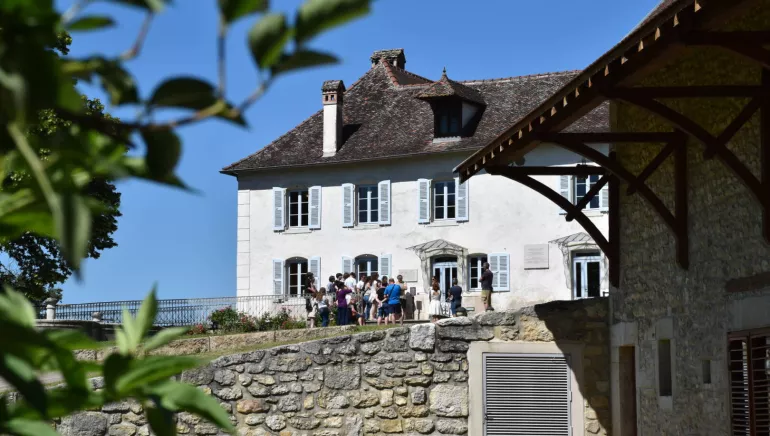Maison d'Izieu, Memorial to exterminated Jewish children
When you arrive, a striking setting awaits you.
At the end of the road, you can see the house with the blue shutters, where Sabine and Miron Zlatin took in over a hundred Jewish children to save them from anti-Semitic persecution. It was in this same house that, on the morning of 6 April 1944, on the orders of Klaus Barbie, one of the heads of the Gestapo in Lyon, 44 children and 7 of their teachers were rounded up and deported. Only one of the instructors, Léa Feldblum, returned.
A memorial museum since 1994, Maison d'Izieu welcomes over 40,000 visitors a year, including 18,000 schoolchildren. Through the history of the colony, it seeks to convey a universal message of vigilance and the fight against all forms of discrimination.
Located on a protected site classified as a historic monument, this residence perched on a hill in the Bugey-Sud region is a must-see in the Auvergne-Rhône-Alpes region, at the gateway to Isère and Savoie.
You can take a guided tour of the house, evoking the lives of the children through letters, drawings and photos.
The museum, housed in the former barn, is divided into three areas to explore in greater depth the historical context of the Second World War, the networks for rescuing Jewish children, international criminal justice, crimes against humanity and the construction of memory.
Since 2022, one area of the museum has been dedicated to the exhibition of its collections, documents and objects that Maison d'Izieu preserves itself: the Galerie Zlatin. Each year, a temporary exhibition is scheduled to give visitors the chance to discover "real" archive documents!
At the end of the road, you can see the house with the blue shutters, where Sabine and Miron Zlatin took in over a hundred Jewish children to save them from anti-Semitic persecution. It was in this same house that, on the morning of 6 April 1944, on the orders of Klaus Barbie, one of the heads of the Gestapo in Lyon, 44 children and 7 of their teachers were rounded up and deported. Only one of the instructors, Léa Feldblum, returned.
A memorial museum since 1994, Maison d'Izieu welcomes over 40,000 visitors a year, including 18,000 schoolchildren. Through the history of the colony, it seeks to convey a universal message of vigilance and the fight against all forms of discrimination.
Located on a protected site classified as a historic monument, this residence perched on a hill in the Bugey-Sud region is a must-see in the Auvergne-Rhône-Alpes region, at the gateway to Isère and Savoie.
You can take a guided tour of the house, evoking the lives of the children through letters, drawings and photos.
The museum, housed in the former barn, is divided into three areas to explore in greater depth the historical context of the Second World War, the networks for rescuing Jewish children, international criminal justice, crimes against humanity and the construction of memory.
Since 2022, one area of the museum has been dedicated to the exhibition of its collections, documents and objects that Maison d'Izieu preserves itself: the Galerie Zlatin. Each year, a temporary exhibition is scheduled to give visitors the chance to discover "real" archive documents!
This establishment is Accueil Vélo and offers specific services for cyclists.
Contact par mail
* Required fields
Report a problem with this establishment
* Required fields
